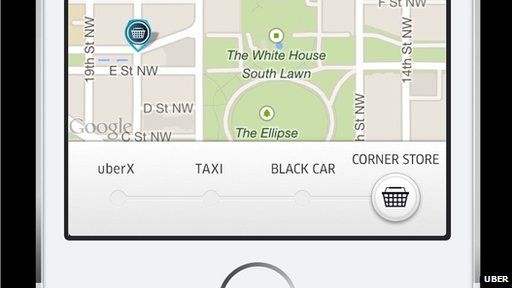Taxi firm Uber starts same-day grocery delivery service in US
- Published

Taxi and private car hire service Uber has launched a grocery delivery service in the US.
The Corner Store facility is available as an option via its main smartphone app and covers more than 100 items.
The products are competitively priced against high street stores, and there is no delivery fee.
The service is an "experiment" limited to Washington DC at this time, but it makes them the latest in a series of tech firms to move into the sector.
Amazon operates AmazonFresh, a same-day "fresh produce and grocery" delivery service, in California and Seattle.
Google offers Shopping Express, a fast-delivery service from Whole Foods, Costco and other stores, that was launched in San Francisco and is now being expanded to New York and Los Angeles.
And Instacart charges a fee to send "personal shoppers" to pick up and deliver a wide range of goods from selected stores promising a one or two hour turnaround. It operates in several US cities including Connecticut, Atlanta, New York and Philadelphia.
One retail analyst suggested that Uber might hope to benefit from giving its drivers - who work on a freelance basis - jobs to do during quiet times of the day.
However, he questioned whether the business model stacked up.
"The biggest hurdle that a lot of these delivery companies have is how can you make the economics of last-mile grocery deliveries add up?" Stephen Mader, director of digital retail at the Kantar consultancy, told the BBC.
"On average, Uber's price points are on a par with what you would find in a physical store such as Walgreens, so what it is trying to do is take the pricing equation out of it from the shopper's perspective.
"But long-term this is most likely not going to be economically feasible unless Uber starts to figure out other ways to monetise this, through adding delivery fees or charging advertising fees to brands that take part in the programme."
Nappies and nail polish
On its blog, Uber says the Corner Store test is only set to last a few weeks, but adds: "The more you love it, the more likely it will last."
It is available Monday to Friday, 09:00 to 21:00 local time, and is limited to addresses based in two zones of the city.
Two categories of products are on offer, with available goods including baby nappies. chewing gum, shaving gel, envelopes and nail polish remover.
Unlike other same-day services, there are no fresh food products, but Uber is inviting users to suggest goods they would like to see added to the list.
At present, there is no minimum purchase meaning a consumer could order the home delivery of a chocolate bar for as little as $1 (60p).
"It's disruptive - shoppers now expect either a retailer or a third-party delivery service to have the ability to get a product to them as fast as conveniently possible," commented Mr Mader.
Big valuation
While the test is the first of its kind for Uber, the firm has used its drivers to deliver ice creams, cocktails, Christmas trees and kittens as part of past promotional campaigns.
In April it also launched UberRush, a package delivery service in New York that uses couriers to make drop-offs by foot and bicycle.
But while the company's main car pick-up service is now active in more than 160 locations - most recently expanding to the Indian cities of Ahmadabad, Chandigarh, Jaipur and Calcutta earlier this week - there have been questions about whether its valuation is justified.
The San Francisco-based business sold a $1.2bn (£721m) stake to Google Ventures, Fidelity Investments and others in June, valuing Uber as a whole at about $18bn (£10.8bn).
This was despite the fact it has relatively few assets - it does not own the cars it uses - and it has faced opposition from several regulatory authorities.
Proving it could profitably expand to other sectors would help justify its valuation and potentially allow it to seek a flotation, which would in turn reward its investors' for their faith in the five-year-old business.
- Published14 August 2014
- Published21 July 2014
- Published29 August 2013